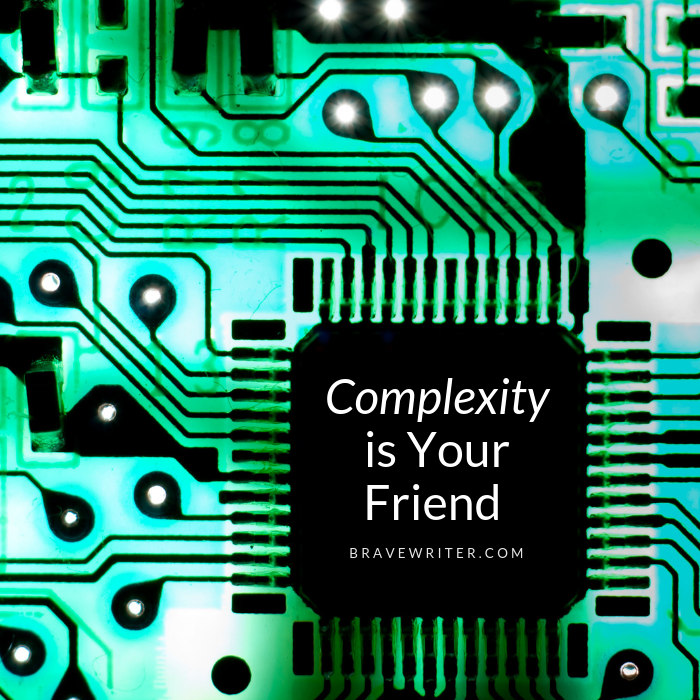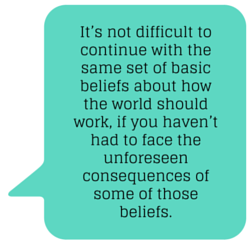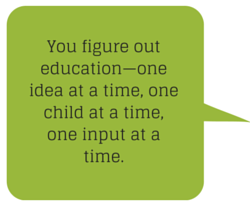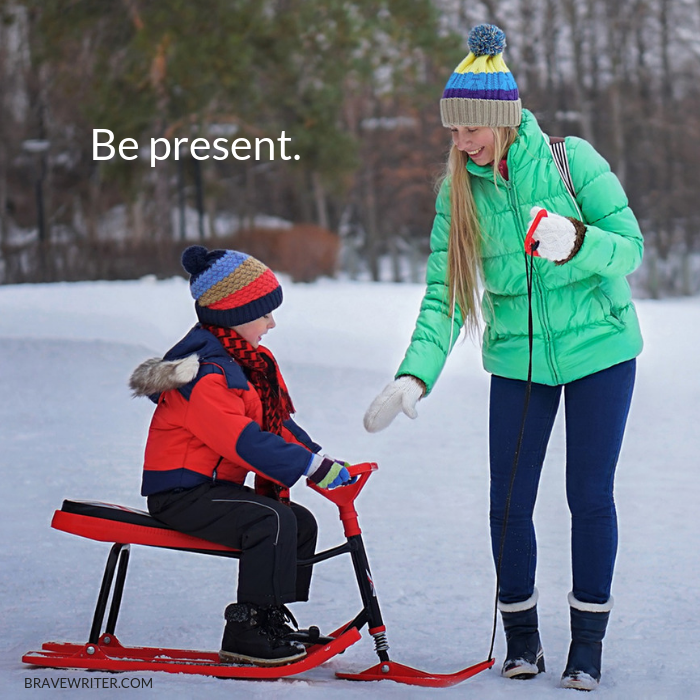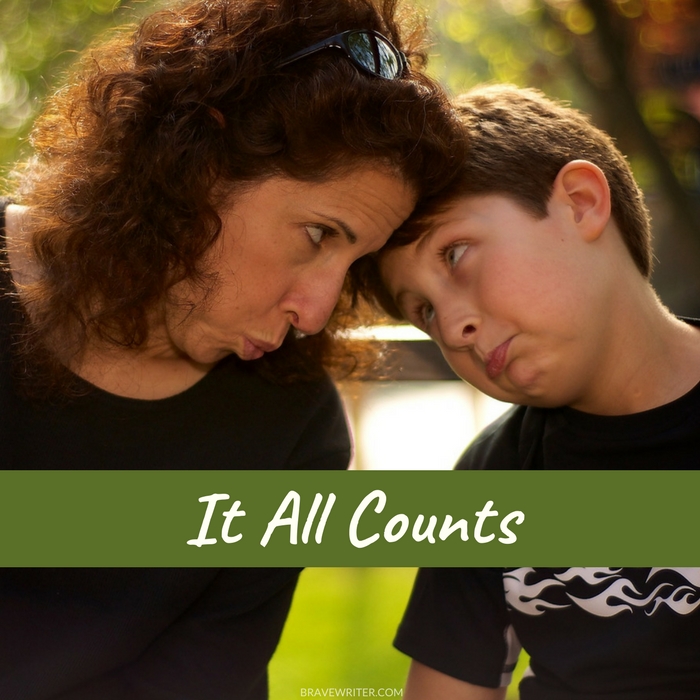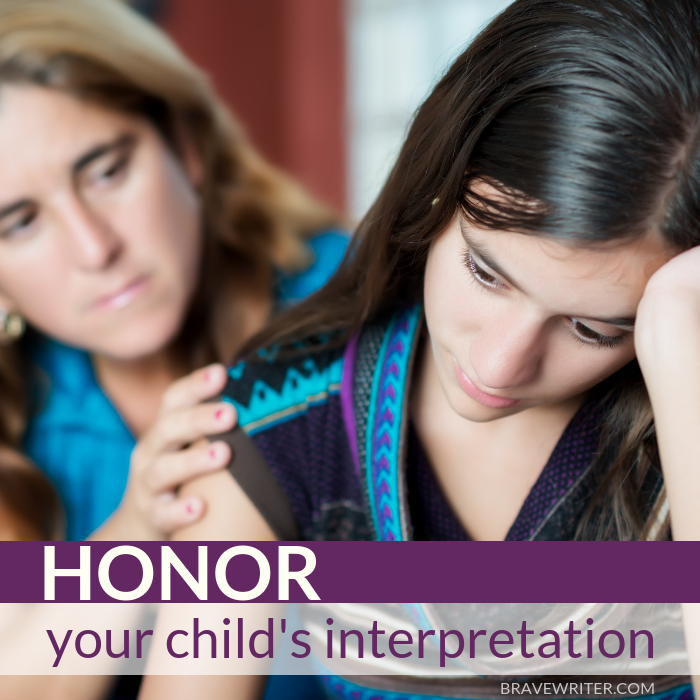
Whether your child is 5, 15, or 25—that individual human being product of your love will one day tell you that something you did harmed him or her. It will show up in a five year old’s “You hurt my feelings” or “You’re mean!” or “I hate when you do X.”
The fifteen year old may tell you that back then you were much more controlling than you are now. A fifteen year old may remind you of punishments that were unjust or harsh words you uttered at the point of exhaustion and morning sickness that hurt that child nonetheless. A fifteen year old may be upset to have been homeschooled, or that the other parent yells so much, or that s/he is unprepared for advanced math.
A 25 year old may see childhood through a different lens—wondering about the impact of political or religious views on family life, re-evaluating the family hierarchy, identifying abuse, calling out discipline tactics.
It’s really tough to listen to your child—the one for whom you’d gladly throw yourself in front of a train—tell you that you failed somehow in your parenting. It’s too easy to dismiss the child’s viewpoint by saying, “I’m not so strict now” or “That was a long time ago and you know I’ve changed” or “It doesn’t seem to have hurt you any” or even, “You’ll understand better when you’re a parent.”
All of these may be true. But they don’t address the central point of the complaint—pain.
When someone tells you that you were a meaningful constitutive part of their pain, it is your right and responsibility to hear them out and to be open to the possibility that you had a role in creating/fostering/causing it.
It’s especially difficult to listen to our children when they are right—when we were too harsh or we permitted the other parent to be cruel. We don’t remember the punishments or the emotional outbursts in the way a child does. Children are vulnerable and small (as in, they have small bodies). Their memories will seem disproportionate to what we remember because for us, we operated from a place of power and size which diminishes the volume and scale of the disciplinary choice.
Think of it like this. Imagine that you are happily walking along on the street, and out of the blue you hear a bullhorn saying this: “Stop walking. This is the police.”
Without a single additional word, your body will go into what I call “tuning fork” mode. The volume and the authority of the speaker will cause your nervous system to immediately ping into electricity and anxiety. You’ll feel in trouble, even if you are not.
This is how our kids feel when we yell at them.
When we raise our voices, we put our children’s nervous systems on high alert. Naturally. Automatically. We are big and powerful, and they are not. Their memories of those moments will match what happened to their insides, not what we explain with logic and reason on the outside.
When your child inevitably comes to you in pain (I hate writing, this is too hard, you are mean, why won’t you listen to me?, I don’t agree with X), it is your privilege as the person closest to that child, the one who loves that person more than anyone else on the planet, to simply hear what he or she has to say.
Sometimes it takes all the courage your can screw together to sit on your hands, and zip your lip, and simply listen without recourse or response. It helped me to have a few key phrases I could say when confronted with my children’s memories that were unpleasant for me to hear.
- “What else…?”
- “Can you tell me more about that?”
- “How else did you feel?”
- “What do you wish had happened?”
- “Am I still doing that now in some way?”
- “I bet it feels awful to not have the power to make the choices for your own life.”
- “I regret that too.”
- “I wish it had been different for you too.”
- “I’m sorry.”
- “I’m so sorry.”
- “I am here if you need to discuss this again or any new thoughts come up.”
- “Is there anything else you want me to know?”
My parents are divorced. When I was about 30 and in therapy, my mom came to me one time (she, too, was in therapy) and made me the most meaningful promise of my life. This is what she told me.
“Julie, I know that there are many ways I failed you as a mother, particularly during the divorce years. As long as I am alive, I want you to know that there is no time when you can’t come to me to tell me about the pain I caused you during that time. I know there will be new moments where the divorce is painful to you now, as an adult. I am willing to hear you and talk with you about any of it, as long as I’m alive. There is no expiration date on discussing your pain.”
I can’t tell you the relief it was to hear those words—and I have taken her up on that commitment more than once. However, conversely (and ironically) because I know that door is wide open, I don’t always need to walk through it. I feel heard and known.
I, too, have caused my children pain. Recently I remember Noah and I discussing a hard season in his childhood. I began to describe it as I remembered it and he said, “Mom, let’s not get into revisionist history here. THIS is how it happened.”
It stopped me cold. I remembered—he owns his story of what happened to him. My memory will never be as important to him as his is. And because I was not the vulnerable child, I am far more likely to whitewash my role in his pain. So I stopped, and I listened, and I suffered a little.
We all want to be heard. We want our version of our life’s events to be acknowledged as real for us. We want someone to say, “You were hurt. I’m so sorry.”
Our kids want that from us. Give it to them. We enhance the space for connection and love when we do, which is the goal all along anyway, right?


